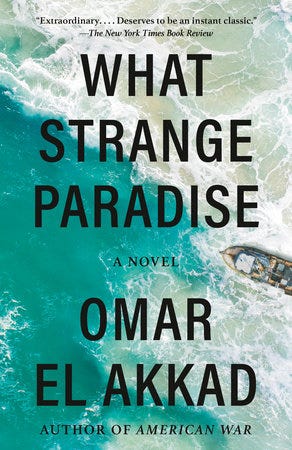The desire for more robust border controls and preventing foreigners from entering countries has become a pivotal issue in politics, as countries in North America and Europe struggle with what they call the “migrant crisis.” El Akkad’s novel provides an alternative standpoint by depicting a fictional account of a young boy’s sea voyage to Greece and what awaits him after his journey.
El Akkad’s story centers around an eight-year-old Syrian boy, Amir, who inadvertently ends up on a dilapidated fishing boat run by human traffickers, leaving Alexandria bound for the Greek Island of Kos. Amir is the only passenger who survives the perilous crossing. He quickly understands that arriving in Kos is no paradise, as he finds himself in the crosshairs of a retired Greek colonel who is hell-bent on rounding up and deporting asylum seekers. Fortunately for Amir, he meets and finds an ally in a Greek teenage girl, Vänna. Together, they embark on an adventure to elude the local authorities, keep Amir safe, and help him get on a ferry that will take him to the mainland.
El Akkad narrates the story alternating between Amir’s plight after his family left war-torn Syria for Egypt, how he had the misfortune to end up on the fishing boat, the ill-fated voyage itself, and his adventure with Vänna.
El Akkad’s novel serves as a rebuttal to the populist narratives in the Global North that dehumanize and objectify asylum seekers from the Global South by employing language that evokes threats of invasion. El Akkad’s description of the journey to Kos elaborates on the changeable weather, the experience of hunger, abysmal overcrowded conditions, fake life jackets, and the punishing seas leading to the ship capsizing. El Akkad masterfully presents a range of characters on the fishing boat whose attitudes shift from having a shared interest in reaching Greece safely towards a calculus of survival as they find themselves pushed to the brink. The development of characters gives the reader insight into the deterioration in human moral frameworks when resorting to an ethic of survival. El Akkad’s portrayal of bodies washing up ashore brings to mind the 2015 picture of two-year-old Syrian boy Alan Kurdi’s lifeless body on the beach.[1] This aspect of the novel humanizes the plight of asylum seekers by exposing the reader to some of the numerous risks asylum seekers take when fleeing unlivable conditions.
Moreover, El Akkad’s rendition of Amir’s escapade with Vänna brings into view how the two of them find a way to navigate language barriers and develop a close bond. Amir’s camaraderie with Vänna and the kindness shown to them by strangers reminds the reader of human connections embodying compassion and empathy that have the potential to transcend culture, gender, and race. In times of rising Islamophobia,[2][3] with politicians either actively encouraging it, passively endorsing it, or paying lip service to addressing it while paying no heed to it, El Akkad’s story nudges the reader into realizing that the spirit of humanism grounded in agapé plausibly necessitates defying authority figures in the service of humanity.
[1] Joel Gunter, “Alan Kurdi: Why One Picture Cut Through,” BBC News, September 4, 2015, sec. Europe, https://www.bbc.com/news/world-europe-34150419.
[2] Faisal Devji, “From Xinjiang to Germany: How Did Islamophobia Become a Global Phenomenon?,” The Guardian, March 27, 2020, sec. Opinion, https://www.theguardian.com/commentisfree/2020/mar/27/xinjiang-germany-islamophobia-global-phenomenon.
[3] Sakshi Venkatraman and Mirna Alsharif, “For Muslim Americans, a Spike in Hate Incidents Feels Reminiscent of Post 9/11 Islamophobia,” NBC News, October 31, 2023, https://www.nbcnews.com/news/asian-america/muslim-americans-spike-hate-incidents-feels-reminiscent-post-911-islam-rcna122570.



